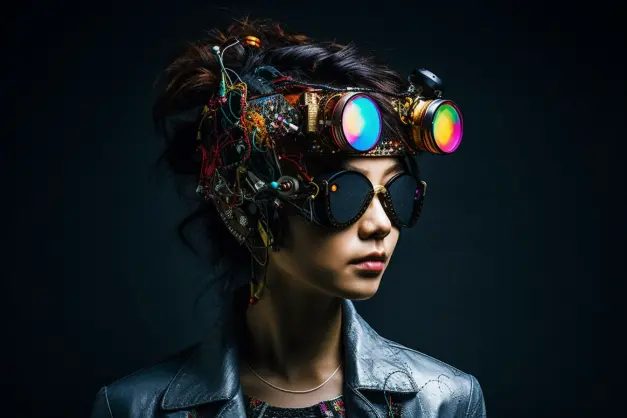The Wearable Revolution: From Step Counting to Lifesaving Insights

The burgeoning realm of wearable technology, fueled by the potent synergy of Artificial Intelligence (AI), stands at the cusp of significantly reshaping our healthcare landscape. What commenced as a quest for monitoring steps and physical exertion has swiftly transcended into a sophisticated ecosystem of biohacking and proactive health monitoring. The narrative of wearables has been enriched further with the infusion of AI, extending its domain from providing real-time health insights to potentially life-saving interventions. As we traverse through the exciting junctures of continuous biomarker monitoring, AI-driven auditory aids, and beyond, the healthcare industry finds itself amidst a transformative era.
The profound impact of the wearables market not only delineates the escalating trust and engagement from consumers but also outlines a vibrant avenue of opportunities awaiting exploration within the healthcare sector. Through the lens of the evolving wearable technology landscape, the exploration into the multifaceted aspects of the wearable revolution unfolds, showcasing its potential in enhancing personal health, reshaping healthcare paradigms, and unlocking untapped data potentials that could steer us towards a future of anticipatory and personalised healthcare.
Wearables: The Vibrant Market and Its Transformative Data Potential
The enthusiasm surrounding wearable technology isn't mere hype. Current market projections suggest a staggering $395 billion value by 2030, which underscores the deepening trust and interest consumers place in these devices. Leading this wave are giants like Fitbit, Oura, Whoop, and Huawei, whose innovative strides are reshaping numerous facets of our lives.
One of the most profound impacts of wearables is in healthcare. Devices such as Oura's sleep cycle trackers and Fitbit's heart rate monitors grant users real-time insights into their health. Beyond just collecting data, these wearables play a vital role in early symptom detection and the overarching approach to wellness management.
Continuous Biomarker Monitoring: A Leap Towards Proactive Health
One of the groundbreaking advancements in wearable technology lies in its ability to continuously monitor vital biomarkers. Envision a world where daily finger pricks to check blood sugar levels are archaic. We are approaching this reality, with innovative sensors in wearable devices enabling non-invasive blood glucose and blood pressure monitoring.
Why is this a big deal? Beyond aiding those with diabetes, monitoring glucose levels offers invaluable insights into overall health, facilitating therapy adjustments and shedding light on diet's influence on glucose. Concurrently, non-invasive blood pressure checks can revolutionise how we predict cardiovascular events, enabling timely intervention.
Holistic Health: More Than Just Numbers
The future of wearables goes beyond just tracking individual metrics. It embraces a comprehensive view of health, promoting overall well-being and safety. When combined with AI's analytical capabilities, this data reveals insights that were once thought unreachable.
A glimpse into this AI-augmented wearable universe includes:
- Smart Glasses for Visual Assistance: These AI-enhanced glasses offer visually impaired individuals a clearer world view.
- Wearable Health Monitors: Continuously tracking vital signs, these devices both alert to potential health risks and facilitate data sharing with healthcare professionals.
- AI-Driven Hearing Aids: Adapting in real-time to diverse auditory environments, these devices offer a pristine listening experience.
- Wearable AI for Cognitive Assistance: Innovations like Google's Project Soli simplify life for those with cognitive challenges, transforming subtle gestures into actionable commands.
- AI-Enhanced ECG Monitors: Devices like the Apple Watch, starting with the Series 4, can detect and alert to irregular heart rhythms, prompting timely medical intervention.
The healthcare paradigm is steadily shifting beyond traditional boundaries. Wearables, enhanced by AI, are bringing professional-grade health monitoring into our homes.
The Untapped Potential of Wearables Data: Harnessing AI's Transformative Power in Healthcare
In the realm of healthcare, data from wearables represents an untapped goldmine. Each heartbeat, step, and sleep cycle logged is a datapoint in a vast multidimensional dataset, pointing towards the horizon of precision medicine. As we delve deeper into this data, the transformative potential of integrating it with cutting-edge AI and data science methodologies becomes evident, heralding a new era in healthcare.
PersonaliSed Health Interventions: The AI-Wearables Symbiosis
Consider the scenario of a middle-aged individual using a wearable to monitor daily activities. Over a period, nuanced variations in their heart rate variability and a decline in activity levels might be observed. By employing sophisticated machine learning models, such as deep neural networks or transformer-based architectures, these patterns can be analysed in combination with other data points, like environmental factors or genetic predispositions. The AI-driven system might then forecast an imminent cardiac event or the onset of fatigue-related conditions. Such predictive analytics could encourage users to pursue timely medical intervention, averting potential health crises.
Beyond immediate emergencies, the continuous stream of health data can influence our day-to-day decisions. Consider an athlete using a wearable device. This tool might spot slight inconsistencies in sleep patterns. When these irregularities align with a decrease in athletic performance, they can be assessed using time series analysis and anomaly detection methods. Sophisticated AI models, employing recurrent neural networks, can then dissect this sequential data over periods of time. Should any deviations or trends surface, the model, aided by attention mechanisms, can highlight specific instances or influential data points. This integrated method provides a comprehensive insight into the athlete's health journey while emphasising key moments or indicators. Based on this analysis, recommendations could be made for adjusting training routines, dietary habits, or introducing biofeedback strategies to boost performance and recovery.
Mental health, often relegated behind physical well-being, can greatly benefit from this data-driven approach. Small changes in sleep rhythms, physical activity, or even biometrics like dermal temperature or heart rate could signal stress or emotional distress. Using techniques like sentiment analysis or clustering algorithms, AI can discern these shifts early, nudging users towards meditation practices, therapeutic interventions, or simply advocating downtime, fostering a comprehensive health strategy.
Community Health Insights: A Macroscopic View
On a broader scale, the ramifications for public health are monumental. Collated data from myriad wearables can provide an insightful overview of community health patterns. For example, an abrupt rise in elevated heart rates and diminished activity levels across a locality could be processed using geospatial analytics, hinting at a potential flu epidemic. Armed with this data-driven intelligence, public health authorities can initiate specific awareness drives or optimise resource distribution.
The fusion of wearable data with state-of-the-art AI and data science methodologies points to a future where healthcare is not merely responsive but anticipatory, tailored, and seamlessly woven into our everyday existence.
Takeaways
The seamless fusion of artificial intelligence (AI) and the abundant data generated by wearables heralds a new dawn in healthcare, transitioning us from mere responsive measures to a realm of anticipatory and personalised health interventions. The profound advancements in wearable technology, from continuous biomarker monitoring to AI-augmented visual and auditory aids, are not only redefining our approach to personal health and wellness but are also presenting immense opportunities for the healthcare industry. The wearable revolution extends beyond merely tracking individual metrics, to providing a comprehensive view of our health, thereby encouraging a proactive and holistic approach towards wellness management. As the market for wearables continues to burgeon, spearheaded by innovators like Fitbit, Oura, and Apple, the immense trust and interest vested by consumers accentuate the transformative potential of these devices.
The plethora of data procured, analysed, and acted upon by AI unveils a realm of possibilities. From early symptom detection to precise predictive analytics these technologies could potentially avert health crises and improve our daily lives. Furthermore, the extensive data landscape furnished by wearables, when synthesised with AI, paves the way for a richer understanding of community health patterns, thus empowering public health authorities with data-driven intelligence to optimally distribute resources or initiate timely awareness campaigns. This synergy between AI and wearables not only enriches individual health experiences but also holds promise for monumental positive impacts within the healthcare industry, presenting a vibrant landscape filled with opportunities waiting to be explored.
Let us solve your impossible problem
Speak to one of our industry specialists about how Artificial Intelligence can help solve your impossible problem

















